八年级上册英语Unit 1 单词讲解复习资料
八年级上册英语unit1知识点整理大全
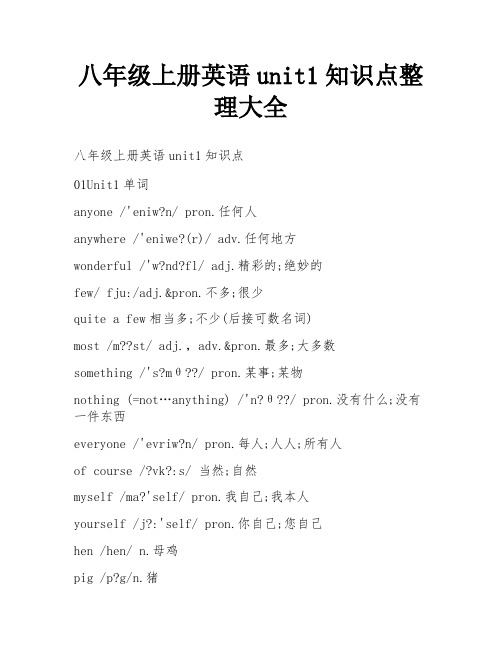
八年级上册英语unit1知识点整理大全八年级上册英语unit1知识点01Unit1单词anyone /'eniw?n/ pron.任何人anywhere /'eniwe?(r)/ adv.任何地方wonderful /'w?nd?fl/ adj.精彩的;绝妙的few/ fju:/adj.&pron.不多;很少quite a few相当多;不少(后接可数名词)most /m??st/ adj.,adv.&pron.最多;大多数something /'s?mθ??/ pron.某事;某物nothing (=not…anything) /'n?θ??/ pron.没有什么;没有一件东西everyone /'evriw?n/ pron.每人;人人;所有人of course /?vk?:s/ 当然;自然myself /ma?'self/ pron.我自己;我本人yourself /j?:'self/ pron.你自己;您自己hen /hen/ n.母鸡pig /p?g/n.猪seem /si:m/ vi.好像;似乎;看来bored /b?:d/ adj.厌倦的;烦闷的someone /'s?mw?n/ pron.某人diary /'da??ri/ n.日记;日记簿(keep a diary)activity /?k't?v?ti/ n.活动decide /d?'sa?d/ v.决定;选定(decide to do sth.)try /tra?/ v.尝试;设法;努力 (try to do sth. /try doing sth.)paragliding /'p?r?ɡla?d??/ n.空中滑翔跳伞feel like 给……的感觉;感受到bird /b?:d/ n.鸟bicycle /'ba?s?kl/ n.自行车;脚踏车building /'b?ld??/ n.建筑物;房子trader /'tre?d?(r)/ n.商人wonder /'w?nd?(r)/ v.想知道;琢磨difference /'d?fr?ns/ n.差别;差异top /t?p/ n.顶部;表面wait /we?t/ v.等待;等候(wait for)umbrella /?m'brel?/ n.伞;雨伞wet /wet/ adj.湿的;雨天的because of因为below /b?'l??/ prep.&adv.在……下面;到……下面enough /?'n?f/ adj.足够的(地)adv.充足的(地);充分的(地) hungry /'h??ɡri/ adj.饥饿的as /?z/ conj.像……一样;如同hill /h?l/ n.小山;山丘duck /d?k/ n.鸭dislike /d?s'la?k/v.&n.不喜爱(的事物);厌恶(的事物) Central Park 中央公园(美国纽约) HuangguoshuWarterfall /'w?:t?(r)f?:l/ 黄果树瀑布(贵州)HongKong /,h??'k??/,/'ha:?,ka:?/香港(中华人民共和国特别行政区)Malaysia /m?'le/马来西亚;Malaysian /m?'le??n/adj.马来西亚的;n.马来西亚人; Georgetown /?d??:d?ta?n/乔治市(马来西亚)Weld /weld/ Quay /ki:/ 海墘街Penang /p??n??/ Hill 槟城山(马来西亚)Tian'anmen Square /skwe?/,/skwer/天安门广场the Palace /?p?l?s/ Museum 故宫博物院Mark /mɑ:(r)k/马克(男名)02Unit1知识梳理Unit1. Where did you go on vacation?【重点短语】1. go on vacation 去度假2. stay at home 呆在家3. go to the mountains 上山/进山4. go to the beach 到海边去5. visit museums 参观博物馆6. go to the summer camp 去夏令营7. quite a few 相当多8. study for为…… 学习,9. go out 出去10. most of the time 大部分时间/绝大多数时间11. taste good 尝起来味道好12. have a good time 玩的开心13. of course 当然可以14. feel like 感觉像……/想要15. go shopping 去购物16. in the past 在过去17. walk around 绕……走18. too many 太多(可数名词前面)19. because of 因为20. one bowl of 一碗……21. find out 查出来/发现22. go on 继续23. take photos 照相24. something important 重要的事情25. up and down 上上下下26. e up 出来【重点句型】1. —Where did you go on vacation? 你到哪里去度假了?—I went to New York City. 我去了纽约城。
八年级上册英语unit1-单词及语法讲解

❖ Maybe they’ll go skateboarding.
❖ He may know the answer.
❖ 15. although = though 虽然
❖ Although he’s ill, he goes to school on time
❖ 虽然他生病了, 但他还是准时上学。
❖ She eats a lot of chocolate, although she is very fat. 虽然她很胖大家,好但她却吃许多的巧克力8 。
❖ time表示不可数名词,意为“时间”。 表示可 数名词,意为“次数,倍数”
❖ What time is it?
❖ I go to the movies three times a week. ❖ 注意“次数”的表达方法 ❖ 一次 once, 两次 twice, ❖ 三次或三次以上用基数词加上times: ❖ three times、five times、
❖
我将在这呆一段时间。
❖
He worked for that company for some time.
❖
他为那家电脑公司工作了一阵子。
❖ (3) some times是名词词组,意为“几次,几倍”
❖ I met him some times in the street last month.
❖
上个月我在街上遇到他好几次了。
I want you to help me with my math. 我想要你帮我学数学。
有很多动词后面用这种结构做动词的复合宾语:
ask sb. to do sth. 叫某人做某事
tell sb. to do sth. 告诉某人去做某事
八年级英语上册Unit1知识点归纳

八年级英语上册Unit1知识点归纳八年级英语上册Unit1学问点第一单元主要点:①复习一般过去时②复合不定代词的用法③反身代词的用法④系动词的用法⑤动词后的”t d和ding 的区分⑥ed形容词和ing形容词的区分⑦“近义词”的区分⑧本单元中的主谓全都现象⑨动词过去式的构成及不规章动词表⑩用同义短语转换同义句时谓语动词形式全都性的培育。
⑾感慨句的构造和连词的选择。
一、词组、短语:1、g n vacatin去度假,2、 sta at he 呆在家,3、g t the untains 上山/进山,4、 g t the beach到海边去,5、visit useus 参观博物馆,6、g t suer cap 去夏令营,7、 quite a fe而且由于坏天气,我们也没能看到下面的任何风光(P5)辨析:because f与becausea. because f意为“由于,由于”,后可接名词、代词或动名词,不能接句子。
He lst his b because f his age.b. because意为“由于”,引导状语从句,即接句子。
I didn’t bu the shirt because itfrget ding sth. 意为“遗忘做过某事(事情已经做过了)” eg: I frget clsing the15. Abut ne hur later, 教师刚刚告知我们擦窗户。
2)eep ding sth. 意为“连续做某事,始终做某事”。
She TV fr tw hurs last night. 昨晚她持续看了两个小时的电视。
23. Everne uped up and dwn in exciteent. 大家都兴奋地跳起来。
(P8)up and dwn 意为“上上下下;来来回回”,在句中作状语。
22. 反身代词:self , urselves, urself , urselves, hiself,herself, itself, theselves.作动词或介词的宾语:常常在en, teach, hurt, bu, intrduce, dress, ill等动词和b, fr, t, f等介词后作宾语。
八年级上册英语unit1_单词及语法讲解上课讲义

7. usually when I come home from school 通常是在我从学校回家时
When + 从句 当……时候 I often stay at home when it is rainy.
❖ 8. I try to eat a lot of vegetables. try to do sth. 尽量/尽力做某事 I’ll try to learn English well. 我会尽量尝试学好英语的。 You must try to take more exercise. 你必须尽量多做运动。
Although he’s ill, he goes to school on time 虽然他生病了,但他还是准时上学。
She eats a lot of chocoபைடு நூலகம்ate, although she is very fat. 虽然她很胖,但她却吃许多的巧克力。
❖ 16. A lot of vegetables help you to keep in good health.
As for fruit,I eat it sometimes. As for him,I never want to see him here. 至于他,我永远不希望在这里见到。
5. My mother wants me to drink it. 我妈妈想要我喝。
❖ want to do sth. 想要做某事 want sb. to do sth. 想要某人干某事 Do you want to go to the movies with me? 你想和我一起去看电影吗?
kind of = a little a kind of 一种 ❖ 14. maybe (adv.) = perhaps 也许,可能
(完整版)新人教版八年级英语上册unit1知识点总结

Unit 1 where did you go on vacation ➢单词复习:任何人Anywhere 精彩的;极好的最多的;大多数的没有什么n.没有。
每人;人人.我自己你自己;你亲自hen pig似乎;好像无聊的;厌烦的;郁闷的Someone Diary 活动;活跃。
决定;选定Paragliding bird bicycle building trader惊奇;想知道;怀疑差异;不同顶部;顶等;等待湿的;雨天的低于;在。
..下面饥饿的;渴望的如同;像.。
一样HillDuck不喜欢;厌恶短语归纳1、go on vacation去度假 ,2、stay at home 呆在家,3、go to the mountains 上山/进山,4、go to the beach到海边去,5、visit museums 参观博物馆,6、go to summer camp 去夏令营,7、quite a few 相当多,8、study for为……学习,9、go out 出去,10、most of the time 大部分时间/绝大多数时间,11、taste good 尝起来味道好,12、have a good time玩的开心,13、of course当然可以,14、feel like(doing sth)感觉像……/想要,15、go shopping购物,16、in the past 在过去,17、walk around绕……走,18、too many 太多(可数名词前面),19、because of 因为,20、one bowl of 一碗……,21、find out 查出来/发现,22、go on继续,23、take photos 照相,24、something important重要的事情,25、up and down上上下下,26、come up出来➢习惯用法、搭配1. buy sth。
for sb.=buy sb. sth。
Unit1 sectionA 知识点讲解 人教版英语八年级上册

八年级上册Unit1Section A单词1. anyone ['eniwʌn] pron.任何人助记any(det.任何的)+one(det.一)= anyone 拆分记忆法典例I don't want anyone to touch the book.我不想让任何人碰这本书联想some(一些)+one(一)= someone(某人)2.anywhere ['eniweə(r)] adv.在任何地方助记any(det.任何的)+ where(adv.在哪里)=anywhere典例Did you go anywhere interesting? 你去过任何有趣的地方吗?I can' t find my pencil anywhere.我在哪儿都找不到我的铅笔联想no(没有)+ where(在哪里)= nowhere(无处,哪里都不)3.wonderful ['wʌndəfl] adj.精彩的;绝妙的助记wonder(n惊奇;奇迹)+(形容词后缀)= wonderful典例a wonderful idea(作定语)一个很棒的主意I think the talk shows are wonderful.(作表语)我认为访谈节目很精彩。
近义fantastic adj极好的常用词缀后缀-ful常加在动词或名词之后帮助构成形容词。
如:use(n.使用)+ful→ useful (adj.有用的),success(n.成功)+ful→successful(adj.成功的), help(v.&n.帮助)+ful→helpful(adj.有帮助的)。
4.few /fju:/ adj.&pron. 不多;很少典例Very few students learn Latin now.(作形容词)现在学拉丁语的学生很少。
Few of us know the truth.(作代词)我们当中没有几个人知道真相。
八年级上册第一单元英语单词重点
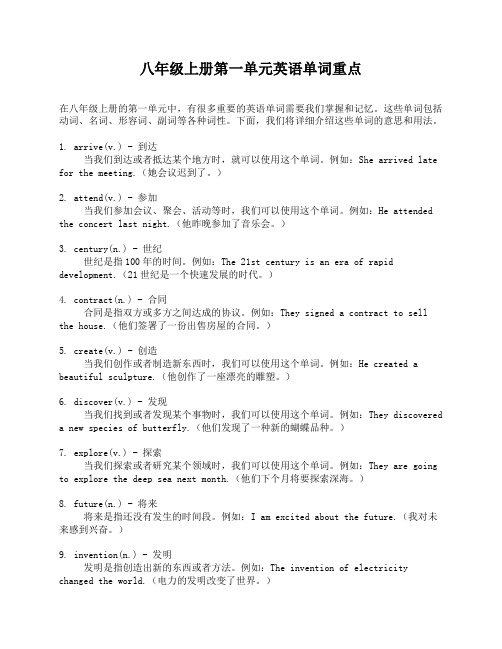
八年级上册第一单元英语单词重点在八年级上册的第一单元中,有很多重要的英语单词需要我们掌握和记忆。
这些单词包括动词、名词、形容词、副词等各种词性。
下面,我们将详细介绍这些单词的意思和用法。
1. arrive(v.) - 到达当我们到达或者抵达某个地方时,就可以使用这个单词。
例如:She arrived late for the meeting.(她会议迟到了。
)2. attend(v.) - 参加当我们参加会议、聚会、活动等时,我们可以使用这个单词。
例如:He attended the concert last night.(他昨晚参加了音乐会。
)3. century(n.) - 世纪世纪是指100年的时间。
例如:The 21st century is an era of rapid development.(21世纪是一个快速发展的时代。
)4. contract(n.) - 合同合同是指双方或多方之间达成的协议。
例如:They signed a contract to sell the house.(他们签署了一份出售房屋的合同。
)5. create(v.) - 创造当我们创作或者制造新东西时,我们可以使用这个单词。
例如:He created a beautiful sculpture.(他创作了一座漂亮的雕塑。
)6. discover(v.) - 发现当我们找到或者发现某个事物时,我们可以使用这个单词。
例如:They discovered a new species of butterfly.(他们发现了一种新的蝴蝶品种。
)7. explore(v.) - 探索当我们探索或者研究某个领域时,我们可以使用这个单词。
例如:They are going to explore the deep sea next month.(他们下个月将要探索深海。
)8. future(n.) - 将来将来是指还没有发生的时间段。
Unit1单词整理人教版八年级英语上册
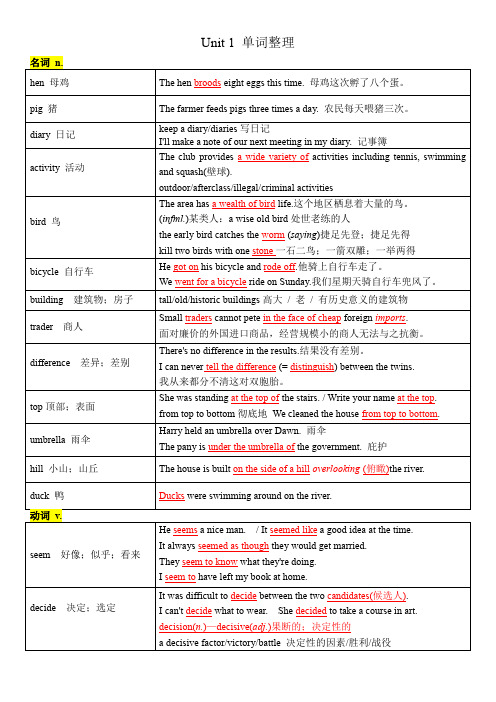
trader商人
Smalltraderscannot petein the face of cheapforeignimports.
enough adj./adv.
足够的;充足的
I didn't haveenough clothesto last a week.
I'vehad enough—there are limits even for the patience of a saint!受够了
This house isn'tbig enoughfor us.
They didasI had asked.按照...方式
She may need some helpasshe's new.因为;由于
as for至于as if/though好像;仿佛
dislike v./n.不喜欢/厌恶
Why do youdislikehim so much?Idislikebeing away from my family.
top顶部;表面
She was standingat the top ofthe stairs./Write your nameat the top.
from top to bottom彻底地We cleaned the housefrom top to bottom.
umbrella雨伞
Harry held an umbrella over Dawn.雨伞
非粗体词
quite a few相当多;不少
八年级上册英语单词及知识点unit1 topic1
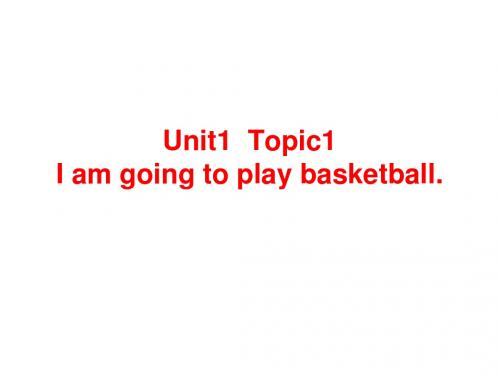
• popular adj.流行的,大众的,受欢迎的 all over 到处,遍及 world n.世界,地球 heart n.心脏,心;纸牌中的红桃 1ung n.肺;肺脏 the day after tomorrow 后天 healthy adj.健康的,健壮的 keep fit 保持健康 fit adj.健康的;适合的;v.(使)适合;安装 supper n.晚饭,晚餐 relax v.(使)放松,轻松 famous adj.著名的 teammate n.队友 excited adj.激动的,兴奋的 bad adj.令人不愉快的;坏的 leave v.离开;把……留下,剩下;n.假期,休假 1eave for 动身去某地 pity n.遗憾,可惜,同情,怜悯
Unit1 Topic1 I am going to play basketball.
against prep.对着,反对 • during prep.在...期间 team win n.队,组 v.获胜,赢得 cheer v.加油,欢呼;喝彩;n.欢呼声,喝彩声 football n.足球运动;足球;橄榄球 cheer...on 为...加油 practice v.& n练习,实践 prefer v.更喜欢,宁愿(选择) row v.划(船);n.(一)排,(一)行 quite adv.相当,很,十分 join v.加入,参加;连接 skate v.溜冰,滑冰;滑(滑板) n.网球 cycle v.骑自行车n.循环,周期 tennis table tennis 乒乓球 player n.运动员,比赛者,选手 rocket n.火箭 dream n.梦想,梦;v.做梦 grow v.成长,生长;发育;种植;变成 grow up 长大成人,成长 scientist n.科学家 future n.将来 in the future 今后 musician n.乐手,音乐家,乐师 pilot n.飞行员,驾驶员 policeman n.男警察 policewoman n.女警察 postman n.邮递员,邮差 fisherman n.渔民,钓鱼的人 jump v.& n.跳跃 spend v.度过;花费(金钱、时间等 exercise v.锻炼n.锻炼,练习 baseball n.棒球 be good at 擅长…,精通 weekend n.周末 part n.部分,一些,片段 take part in 参加,加入 be good for 对……有益 health n.健康,保健
Unit1单词详解人教版八年级英语上册

unit1 where did you go on vacation?1.Where did you go on vacation?你去哪度假了?go on vacation“去度假”,相似短语为be on vacation“在度假”英语中“on+名词”结构表示“在某种状态中”I am on vacation in Qingdao now. 我现在在青岛度假Tina is on duty today. 缇娜今天值日2.Did you go with anyone?你和别人一起去的吗?anyone复合不定代词,近义词为anybody。
用于肯定句时,意为“任何人”;用于否定、疑问句时意为“有人”,anyone做主语时,谓语动词用单数;Any one of my students can answer the question.我班里任何一个学生都能回答这个问题Be quiet,someone is sleeping. 安静,有人在睡觉Is there anyone in the room?Let’s go,I think there is no one in the room.We have all kinds of fine Tshirts,which one do you like?Any one will do(相当于Any one is ok)任何一个都行3.oh,did you go anywhere interesting?I can’ find my pen anywhere. 我哪儿都找不到我的钢笔No,I looked everywhere,but I didn’t find it. 不,我哪都找了,就是找不到4.We took quiet a few photos theretake photos“拍照”take a photo of sth/for sb“给某人/某物拍照”Can you take a photo for me?你能帮我拍张照吗?Very few students learn Latin now. 现在很少有学生学习拉丁语了There is a few books on the desk. 桌子上有几本书We can speak Chinese and a little English. 我们能说中文和一点英文5.Yes,I bought something for my father.buy的过去式是:bought(bring的过去式是:brought)I bought a nice skirt for my sister.=I bought my sister a nice skirt.I’d like something to drink.Would you like something to eat?我想要点喝得,你想吃什么吗?There isn’I heard a noise,what was it?我听到吵闹声,是什么?Nothing(It was nothing)啥也没有6.Did everyone have a good time?每个人玩的开心吗?everyone近义词everybody,意为“人人,每个人,所有人”Everyone in our class likes Mr.Li. 班里每个人都喜欢李老师every one用法类似于any one;即可指人也可指物,后接of+名词/代词have a good time=have fun=enjoy oneself “玩的开心”have a good time in doing something 表示做某事很开心7.反身代词及其用法:反身代词可做宾语、表语。
八年级上册unit1知识点

八年级上册unit1知识点在八年级上册中,第一单元主要涵盖了词汇、语法和阅读理解等方面的知识点。
下面将详细介绍该单元的主要知识点。
一、词汇1. 基础词汇第一单元中涉及到了许多基础词汇,如:country(国家)、city(城市)、language(语言)、culture(文化)等。
这些词汇在学习英语课程时需要重点掌握。
2. 形容词和副词在第一单元中,形容词和副词也是重要的词汇部分。
形容词如:beautiful(美丽的)、interesting(有趣的)、funny(滑稽的)等;副词如:carefully(小心地)、slowly(慢慢地)、gracefully(优美地)等。
3. 常用短语除了上述词汇之外,第一单元还包括了一些常用短语,如:be famous for(以……而著名)、be interested in(对……感兴趣)、take pride in(以……为傲)、look forward to(期待)等。
4. 单词拼写第一单元也会涉及到一些常见单词的拼写,如:language(语言)、century(世纪)、famous(著名的)等词汇。
二、语法1. 名词单数和复数在英语语法中,名词的单数和复数变化是很基础的部分。
在第一单元中,我们需要掌握一些单数和复数形式不规则的名词,例如:child(孩子)的复数形式为children,foot(脚)的复数形式为feet等。
2. 不定代词第一单元也包括了不定代词的语法部分。
不定代词有些是单词,如:some、any、no和every等;有些是由所有格代词+one/two/three等构成,如:myself、yourself、oneself等。
3. 介词介词在英语中是一种十分常见的语法形式。
在第一单元中,我们需要学习一些常用的介词,如:in(在……里面)、on(在……表面)、under(在……下面)、over(在……上面)等。
三、阅读理解第一单元的阅读理解主要涵盖了文化和旅游方面的内容。
Unit1单词知识点讲义人教版英语八年级上册

2023年人教版初中英语八年级上册Unit 1单词知识点讲解(讲义)1. anyonea.pron. 任何人,某个人 (否定句和疑问句)I won’t tell anyone that I saw you here.我不会告诉任何人我在这儿见着你了。
You needn’t talk to anyone if you don’t want to.如果你不想的话,你不需要跟任何人说话。
Why would anyone want that job?为什么会有人想要做那样的工作?Is there anyone in the classroom?教室里有人么?b.pron. 任何人(肯定句表强调)或者用在“anyone who +句子”的结构中Anyone can do what I am doing now.任何人都可以做我正在做的事情。
This job isn’t for anyone who is slow with numbers.这份工作不适合对数字不感冒的人。
c.anyone同义词anybody2. anywherea. adv.任何地方(否定句和疑问句中)Do you have anywhere to live?Did you try to get help from anywhere?Did you go anywhere interesting?Have you ever been to Beijing, Shanghai or anywhere?b. adv.任何地方(肯定句表强调)I’ll meet you anywhere you want.3. wonderfuladj. 极棒的; 绝妙的;It’s wonderful to see you here.She is a wonderful mother.wonder v.想知道 n. 奇迹4. fewdet./pron./adj. 几个;很少a few +可数名词复数, 译为”几个,一些”a few apples 几个苹果few+可数名词复数, 译为”很好,没有”few houses 很少房子;几乎没有房子a liitle +不可数名词, 译为”一些”little+不可数名词, 译为”没有,很少”I have little time to chat with you.5. quite a few 相当多的Quite a few people are going there.6. mostdet./pron./adj. 大多数的much,many,a lot of的最高级, 译为最多adv.极其,最大程度上的;最Most animals are afraid of fire.Most of my friends are Chinese.I like most vegetables.He thought the whales were the most beautiful animals.The most important thing in life is that you never lost yourself.7. somethingpron. 某事;某物There was something wrong with the car.something like 有点儿像…She made a sound, something like a cat.真不错She’s really something.or something; or something like that诸如此类的…Could you please give some water, milk or something?Many foreigners think all Chinese people can do Gongfu or something like that.8. nothingpron./adj./adv./n. 没什么;没一个;不重要She nodded her head but said nothing.Nothing beats home cooking. 什么也比不上家里做的好吃。
八年级上册英语unit1知识点归纳
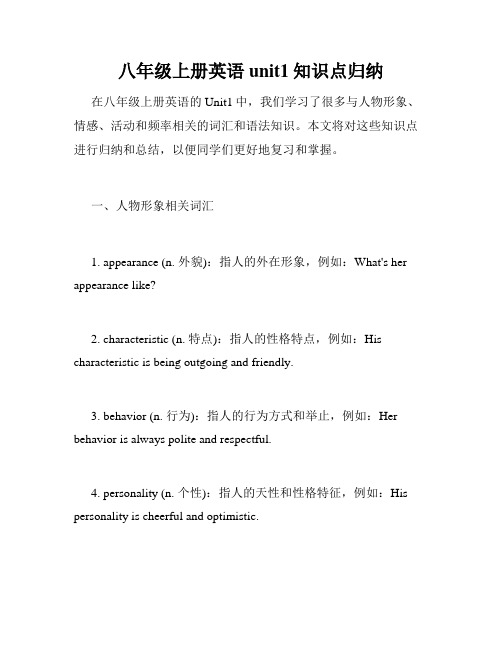
八年级上册英语unit1知识点归纳在八年级上册英语的Unit1中,我们学习了很多与人物形象、情感、活动和频率相关的词汇和语法知识。
本文将对这些知识点进行归纳和总结,以便同学们更好地复习和掌握。
一、人物形象相关词汇1. appearance (n. 外貌):指人的外在形象,例如:What's her appearance like?2. characteristic (n. 特点):指人的性格特点,例如:His characteristic is being outgoing and friendly.3. behavior (n. 行为):指人的行为方式和举止,例如:Her behavior is always polite and respectful.4. personality (n. 个性):指人的天性和性格特征,例如:His personality is cheerful and optimistic.5. occupation (n. 职业):指人的职业,例如:What's your occupation?二、情感相关词汇1. feeling (n. 感觉):指人的感觉和情感,例如:I have a good feeling about this.2. emotion (n. 情感):指更强烈的感情反应,例如:The news filled her with emotions of happiness and relief.3. mood (n. 心情):指人的心情状态,例如:What mood are you in today?4. express (v. 表达):指用语言、动作等方式表达情感或思想,例如:He expressed his gratitude to the team.5. attitude (n. 态度):指个体对事物的看法和评价,例如:His attitude towards the assignment was positive.三、活动相关词汇1. relax (v. 放松):指缓解压力或紧张状态,例如:I like to relax by taking a hot bath.2. exercise (n. 锻炼):指身体运动,例如:Regular exercise is good for your health.3. hobby (n. 爱好):指喜欢的活动或娱乐方式,例如:My hobby is reading.4. entertainment (n. 娱乐):指各种形式的娱乐活动,例如:Cinema is a great form of entertainment.5. travel (v. 旅游):指外出旅行,例如:I love to travel to different countries.四、频率相关词汇1. sometimes (adv. 有时):指在某些时间发生或出现,例如:I sometimes forget to do my homework.2. often (adv. 经常):指发生的频率比较高,例如:I often go swimming on weekends.3. rarely (adv. 很少):指极少数的频率,例如:I rarely eat fast food.4. always (adv. 总是):指经常发生或持续存在,例如:I always wake up early in the morning.5. never (adv. 从不):指完全不发生,例如:I never drink coffee before sleeping.五、语法知识1. 一般现在时:表达现在的事实和习惯,例如:I often go to the gym.2. 现在进行时:表达正在进行的动作,例如:She is reading a book.3. 物主代词:表示所有者或归属关系,例如:That book is mine.4. 介词短语:表示时间、地点、方式等词语的组合,例如:I study English in the library.5. 比较级:表示两个事物之间的比较关系,例如:My car is faster than yours.综上,八年级上册英语Unit1的知识点涵盖了人物形象、情感、活动和频率等方面的词汇和语法知识。
[精]人教版八年级英语上册Unit1单词、知识梳理、词汇句式精讲
![[精]人教版八年级英语上册Unit1单词、知识梳理、词汇句式精讲](https://img.taocdn.com/s3/m/24120ae2a26925c52dc5bf48.png)
人教版八年级英语上册Unit1单词、知识梳理、词汇句式精讲一、单词anyone /'eniwʌn/ pron.任何人anywhere /'eniweə(r)/ adv.任何地方wonderful /'wʌndəfl/ adj.精彩的;绝妙的few/ fju:/adj.&pron.不多;很少quite a few相当多;不少(后接可数名词)most /məʊst/ adj.,adv.&pron.最多;大多数something /'sʌmθɪŋ/ pron.某事;某物nothing (=not…anything) /'nʌθɪŋ/ pron.没有什么;没有一件东西everyone /'evriwʌn/ pron.每人;人人;所有人of course /əvkɔ:s/ 当然;自然myself /maɪ'self/ pron.我自己;我本人yourself /jɔ:'self/ pron.你自己;您自己hen /hen/ n.母鸡pig /pɪg/n.猪seem /si:m/ vi.好像;似乎;看来bored /bɔ:d/ adj.厌倦的;烦闷的someone /'sʌmwʌn/ pron.某人diary /'daɪəri/ n.日记;日记簿(keep a diary)activity /æk'tɪvəti/ n.活动decide /dɪ'saɪd/ v.决定;选定(decide to do sth.)try /traɪ/ v.尝试;设法;努力(try to do sth. /try doing sth.) paragliding /'pærəɡlaɪdɪŋ/ n.空中滑翔跳伞feel like 给……的感觉;感受到bird /bɜ:d/ n.鸟bicycle /'baɪsɪkl/ n.自行车;脚踏车building /'bɪldɪŋ/ n.建筑物;房子trader /'treɪdə(r)/ n.商人wonder /'wʌndə(r)/ v.想知道;琢磨difference /'dɪfrəns/ n.差别;差异top /tɒp/ n.顶部;表面wait /weɪt/ v.等待;等候(wait for)umbrella /ʌm'brelə/ n.伞;雨伞wet /wet/ adj.湿的;雨天的because of因为below /bɪ'ləʊ/ prep.&adv.在……下面;到……下面enough /ɪ'nʌf/ adj.足够的(地)adv.充足的(地);充分的(地)hungry /'hʌŋɡri/ adj.饥饿的as /əz/ conj.像……一样;如同hill /hɪl/ n.小山;山丘duck /dʌk/ n.鸭dislike /dɪs'laɪk/v.&n.不喜爱(的事物);厌恶(的事物)Central Park 中央公园(美国纽约)HuangguoshuWarterfall /'wɔ:tə(r)fɔ:l/ 黄果树瀑布(贵州) HongKong /,hɒŋ'kɒŋ/,/'ha:ŋ,ka:ŋ/香港(中华人民共和国特别行政区)Malaysia /mə'leɪʒə/马来西亚;Malaysian /mə'leɪʒn/adj.马来西亚的;n.马来西亚人; Georgetown /ˈdʒɔ:dʒtaʊn/乔治市(马来西亚)Weld /weld/ Quay /ki:/ 海墘街Penang /pɪˈnæŋ/ Hill 槟城山(马来西亚)Tian'anmen Square /skweə/,/skwer/天安门广场the Palace /ˈpæləs/ Museum 故宫博物院Mark /mɑ:(r)k/马克(男名)Unit 1 知识梳理Unit1. Where did you go on vacation? 【重点短语】1. go on vacation 去度假2. stay at home 呆在家3. go to the mountains 上山/进山4. go to the beach 到海边去5. visit museums 参观博物馆6. go to the summer camp 去夏令营7. quite a few 相当多8. study for为……学习,9. go out 出去10. most of the time 大部分时间/绝大多数时间11. taste good 尝起来味道好12. have a good time 玩的开心13. of course 当然可以14. feel like 感觉像……/想要15. go shopping 去购物16. in the past 在过去17. walk around 绕……走18. too many 太多(可数名词前面)19. because of 因为20. one bowl of 一碗……21. find out 查出来/发现22. go on 继续23. take photos 照相24. something important 重要的事情25. up and down 上上下下26. come up 出来【重点句型】1. —Where did you go on vacation? 你到哪里去度假了?—I went to New York City. 我去了纽约城。
仁爱版八年级上册英语-Unit1:Topic1单词汇总+知识梳理

仁爱八上・Unitl Topicl知识梳理重点短语:1.see sb. do sth.看见某人做(过某事或经常做某事)see sb. doing sth.看见某人正在做某事2.cheer sb. on使某人振作起来3.prefer doing sth.更喜欢做某事4.quite a lot 多,相当多5.play for 为 .. 效力6.go cycling骑自行车7.go mountain climbing 去爬山8.sb・ spend some time/money in doing sth. 某人花费时间/钱做某事9.there is/are going to be… 将会有 ..10.take part in=join in 参加(活动)join加入(组织)11 .the high jump 跳高12.the long jump 跳远13.all over the world=around the world全世界14.make sb./sth.+v./adj・15.a good way to do sth.一个做某事的好方式16.keep fit/healthy 保持健康17.arrive in+大地点arrive at+小地点18.play against 与.. 对抗19.leave for sp.前往某地leave sp.离开某地2O.Ifs a pity that+从句遗憾的是 ....21 .be going to do sth.打算做某事22.the day after tomorrow 后天23.in the future 在将来24.table tennis 乒乓球25.grow up长大成人,成长26.be good at doing sth•擅长做某事重点句型:l-Tm going to play basketbaIL我打算打篮球。
2.We are going to have a basketball game against Class Three on Sunday. 我们打算在星期天举行一场对抗三班的篮球赛。
人教版八年级上册英语Unit-1-5-全部词汇详解课件(137页)全文

taste it.
prep. & adv. 在……下面; 到……下面
反义词: above,意为“超过;在……上面”。 例句: ◆ From the top of the building, I could
短语:twice a week 一周两次 think twice 再三考虑
例句: ◆ I go to the movies twice a week. ◆ The ruler is twice as long as that one.
拓展: “一次”用once,“两次”用twice, “三次及以上”用“基数词+times” 如:twice a day, four times a year
dislikes.
Unit 2 How often do you exercise?
Section A
n.家务劳动; 家务事
构成: house(n. 房子)+ work( n. 工作) 短语:do (the) housework 做家务 例句:
◆ He is too lazy so he hardly does housework.
拓展:enjoyable 的相关词 enjoy: v. 享受;喜爱 enjoyment: activities 例句: The park is a popular place
for relaxing activities.
v. 决定;选定
句型: decide (not) to do sth. 决定(不)做某事 decide+“疑问词+动词不定式” decide+宾语从句 decide on sth. 就某事做决定;选定某事 例句:
八年级上册英语第一单元单词知识点

八年级上册英语第一单元单词知识点一、重点单词1. anyone ['eniwʌn] pron. 任何人常用于疑问句和否定句中。
例句:Did anyone call me? 有人打电话给我吗?2. anywhere ['eniweə(r)] adv. 在任何地方常用于疑问句和否定句中。
例句:I can't find it anywhere. 我在任何地方都找不到它。
3. wonderful ['wʌndəfl] adj. 精彩的;绝妙的例句:We had a wonderful time at the party. 我们在聚会上玩得很开心。
4. few [fjuː] adj. & pron. 不多;很少修饰可数名词复数,表示否定含义。
例句:Few people like snakes. 很少有人喜欢蛇。
5. quite a few 相当多;不少例句:I have quite a few friends here. 我在这里有不少朋友。
6. most [məʊst] adj.,adv. & pron. 最多;大多数例句:Most students like sports. 大多数学生喜欢运动。
7. something ['sʌmθɪŋ] pron. 某事;某物常用于肯定句中。
例句:There is something wrong with my bike. 我的自行车出了点问题。
8. nothing ['nʌθɪŋ] pron. 没有什么;没有一件东西例句:I have nothing to do today. 我今天无事可做。
9. everyone ['evriwʌn] pron. 每人;人人;所有人例句:Everyone is here. 大家都在这儿。
10. of course [əv kɔːs] 当然;自然例句:—Can I come? —Of course. —我能来吗?—当然可以。
人教版八年级上册英语知识点及单词

人教版八年级上册英语知识点及单词Unit1 Where did you go on vacation?go on vacation去度假stay at home待在家里go to the mountains去爬山go to the beach去海滩visit museums 参观博物馆go to summer camp去参观夏令营quite a few相当多study for为……而学习go out出去most of the time大部分时间taste good尝起来很好吃have a good time玩得高兴of course当然feel like给……的感觉;感受到go shopping去购物in the past在过去walk around四处走走because of因为one bowl of…一碗……the next day第二天drink tea喝茶find out找出;查明go on继续take photos照相something important重要的事up and down上上下下come up出来buy sth. for sb. / buy sb. sth.为某人买某物taste + adj. 尝起来……look+adj. 看起来……nothing…but+动词原形除了……之外什么都没有seem+(to be)+ adj. 看起来……arrive in+大地点/ arrive at+小地点到达某地decide to do sth.决定去做某事try doing sth.尝试做某事/ try to do sth.尽力去做某事forget doing sth.忘记做过某事/ forget to do sth.忘记做某事enjoy doing sth.喜欢做某事want to do sth.想去做某事start doing sth.开始做某事stop doing sth. 停止做某事dislike doing sth. 不喜欢做某事keep doing sth.继续做某事Why not do. sth.?为什么不做……呢?so+adj.+that+从句如此……以至于……tell sb. (not) to do sth. 告诉某人(不要)做某事Unit2 How often do you exercise?help with housework帮助做家务on weekends在周末how often多久一次hardly ever几乎从不once a week每周一次twice a month每月两次every day每天be free有空go to the movies去看电影use the Internet用互联网swing dance摇摆舞play tennis打网球stay up late熬夜;睡得很晚at least至少have dance and piano lessons上舞蹈课和钢琴课go to bed early早点睡觉play sports进行体育活动be good for对……有好处go camping去野营not…at all一点儿也不……in one’s free time在某人的业余时间the most popular最受欢迎的such as比如;诸如old habits die hard积习难改go to the dentist去看牙医morn than多于;超过less than少于help sb. with sth.帮助某人做某事How about…? ......怎么样?/ ……好不好?want sb. to do sth.想让某人做某事How many+可数名词复数+一般疑问句?……有多少……?主语+find+that从句. ……发现……spend time with sb.和某人一起度过时光It’s+ adj.+ to do sth. 做某事的……的。
- 1、下载文档前请自行甄别文档内容的完整性,平台不提供额外的编辑、内容补充、找答案等附加服务。
- 2、"仅部分预览"的文档,不可在线预览部分如存在完整性等问题,可反馈申请退款(可完整预览的文档不适用该条件!)。
- 3、如文档侵犯您的权益,请联系客服反馈,我们会尽快为您处理(人工客服工作时间:9:00-18:30)。
Unit 1 Where did you _______ ________ ______________? (你去哪里度假了?)回答:I ________ ________ the beach with my parents. (我和我的父母去了海滩。
)单词讲解:1.▲任何人:____________ (一般用于一般疑问句和否定句中),形容词要放在后面。
例题1:Do you know _________here? A. someone else(其他的) B. else someone C. anyone else D. else anyone 对应词是“某个人”(用于肯定句):_______________.例题2:There must be ________________here, because I found some footsteps(脚印)on the land.A. someoneB. anyoneC. everyoneD. none▲2. 在任何地方:____________(一般用于一般疑问句和否定句中),形容词要放在后面。
例题1:We can’t find ___________to go on vacation.A. somewhere interestingB. interesting somewhereC. anywhere interestingD. interesting anywhere例题2:Would you like to go _______________ when you have free time?A. somewhere interestingB. interesting somewhereC. anywhere interestingD. interesting anywhere对应词是“在某个地方”(用于肯定句):_______________例题3:I would like to go ___________ after I retire.(退休)A. somewhere quietB. quiet somewhereC. anywhere quietD. quiet anywhere(注意:somewhere 和anywhere为不定副词,所以前面不加“to”)3.精彩的:wonder + ful=_________________ 同义词有:excellent, great▲4. 不多,很少:_________+可数名词复数(表示否定,几乎没有),其肯定式为:a few +可数复数(表示有几个)例题1:I’m new here. I have _______friends here.A. a littleB. littleC. a fewD. few对应词组:a little +不可数(表示有一点)little +不可数(表示没有)例题2:There is ________ meat in the fridge(冰箱). Please go to the supermarket and buy some.A. a littleB. littleC. a fewD. few5.相当多(短语):______________________ + 可数名词复数(切记few后面不带“of”)例题:There are _______ _______ _________ cars in the street.(大街上汽车相当多。
)同义短语:quite a lot (如果后面加名词要带”of”,名词可数和不可数都行)上句可改写为:There are quite a lot of cars in the street.又如:The old man has quite a lot of money.6. 最多:__________ 短语:……的大多数most of例题:我们中的大多数骑自行车上学。
________ _______ ________ ride our bikes to school.▲7. 某事,某物:___________________(用于肯定句),形容词要放在后面。
例题1:I have ______________ _________________ (重要的事情)to tell you.其疑问句或否定句要变成:__________________例题2:Did you read _____________ in this morning’s newspaper?A. something interestingB. interesting somethingC. interesting anythingD. anything interesting▲8.没有什么:_________________= not.. anything例题:①The woman said nothing and went out. (改为同义句)The woman ________ ________ ____________ and went out.② My grandfather didn’t read today’s newsp aper, because there was _______in it.A. something interestingB. interesting anythingC. anything interestingD. nothing interesting9. 每个人:___________例题:Everyone ________(be) here today.10. 当然(短语):_______________= Sure▲11. 我自己:____________ 你自己:____________ 他自己:_____________ 她自己:__________ 它自己:__________我们自己:你们自己:他们自己:(8大反身代词)12. 母鸡:_________ 13猪:________▲14. 好像,似乎:___________重点句型:It seems (seemed)that + 句子. (似乎……)= sb. seems (seemed)to do …(某人似乎……)例题:①似乎天要下雨了。
_______ _______ _________ it is going to rain.②上个月Tom好像去北京了。
It __________ that Tom _______ to Beijing last month.=Tom ________ _______ ________ to Beijing last month.(把上句改为同义句)③Sally seemed to be bored. (改为同义句)It _________ that Sally ________ bored.15.厌倦的,烦闷的,无聊的(指人):__________ (指人要”ed”结尾)无趣的,无聊的(指物):__________ (指物“ing”结尾)例题:当我听到这个无趣的新闻我感到很烦闷。
I felt ________ when I heard the _________news. (用适当的单词填空)16. 某人:____________(用于肯定句,参考讲解1)17. 日记:__________ keep a diary (汉语意思):_____________18. 有乐趣的:enjoy + able= _____________19. 活动:_____________ ----(复数)_________________一些有乐趣的活动:some _______________ __________________▲20. 决定:___________重点短语:某人决定去做某事:Sb. decide to do sth.某人决定不去做某事:Sb. decide not to do sth.例题1:昨天我们决定去海滩。
We _________ ______ ________ to the beach yesterday.例题2:There are so many shirts in the clothes store. We can’t decide ________A.to buy which oneB. which to buy oneC. which one to buyD. which to buy one▲21. 尝试:____________ 短语:尝试去做某事________________...例题:去年我尝试在河里游泳。
I ________ ______ _________ in the river last year.22. 滑翔伞运动:_______________▲23. 感觉像,感觉到,想要(短语)________________ + doing…= wa nt to do …= would like to do ….例题:Do you feel like ________ to my birthday this evening?A. comeB. comesC. cameD. coming上句可改写为:Do you _______ ______ ________ to my …?或:Would you _______ ______ _______ to my ….?24. 鸟:___________例句:去年我尝试了滑翔伞运动。
我感觉就像是只鸟。
Last year I ________ paragliding. I ________ ________ I _________a bird.25. 自行车:____________= bike26. 建筑物:build + ing =____________ 例题:There are lots of tall ____________(build) in the big city.27. 商人:__________▲28. 想知道:__________= want to know例题:I wanted to know if I could have a new mobile phone. (改为同义句)I ____________ if I could have a new mobile phone.▲29. 差别,差异:different(不同的)---------__________________ (名词)例题:There are many ________________(different) between the two pictures.Different people may describe the same person _______________(different).30. 顶部:___________ 短语:在……的顶部at the top of例句:在山顶上我们又一次看到了太阳。
